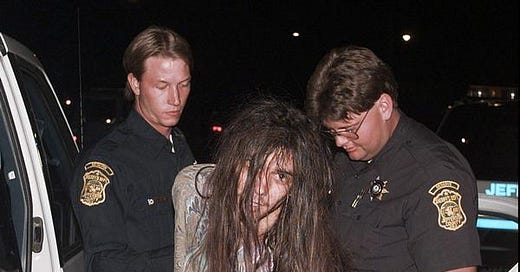SET 1: Chalk Dust Torture, Funky Bitch, Guyute, Fee > Split Open and Melt, The Mango Song, The Sloth, Maze, Loving Cup
SET 2: AC/DC Bag > Reba, Scent of a Mule, Sample in a Jar > David Bowie, Sweet Adeline, Slave to the Traffic Light
ENCORE: Theme from Star Trek, Rocky Top
It seemed like a good idea at the time. From 1993 through 1995, Phish made the Red Rocks Amphitheatre a regular stop, establishing themselves as a viable large-venue act even far from New England. After a one-off in 1993, they played well-received two-night runs at the scenic venue in 1994 and 1995. So why not double it again for 1996?
For a four-day run in August, Phish and their fans — too many of their fans — moved into tiny Morrison, CO, population 465. It didn’t go well. Just three years ago, the Red Rocks capacity of 9,500 seemed a stretch goal for Phish to fill on a tour of mostly theaters and concert halls. But in the summer of 96, when the band was about to attract 700% of that audience to its own festival, the combination of seven months of pent-up demand, an abridged tour, and a giant Jerry Garcia-shaped hole created a combustible mixture.
You can point fingers in a lot of directions for the “disturbance” at Red Rocks. In the news clip linked above, the riot-gear-sporting cops are at their meathead worst, while the wooks are inconsiderately partying in the middle of the dang street instead of in a campground or a park somewhere. But Phish management shares the blame too, for not realizing that the band, in their newfound status as the undisputed king of the jamband heap, had outgrown the intimate setting of Red Rocks.
A venue policy of prohibiting ticketless fans from entering the park where Red Rocks sits diverted the freeloaders to the town center, and the inevitable drum circles ensued, sparking confrontation on the second night of the run. According to the news reports, the back half of Phish’s four-night stand was almost cancelled, or moved 20 miles away to the far less charming Denver Coliseum. By the end of the weekend, Phish had reportedly been banned from Red Rocks, and didn’t return (at least as a foursome) until 2009.
The result was the dark inverse of 7/2/95, a warning sign that the ugly elements of the Dead’s latter days had migrated over. It’s not like it came out of nowhere; see also the shuttle bus shitshow of Waterloo last summer, or the human ladders of Appalachian State in November 1994. But without the giant magnet of the Dead to siphon off the party-first parasites and the narcs, Phish became the new preferred host. The infection would only build for the next four years, but at the time I remember the riot reports as a shock to the Phish scene. Us? The dork band with the nerd fans? Are we the bad guys now?
Red Rocks was also the Mr. C to the Agent Cooper of the Clifford Ball, the evil twin of the summer that Phish realized it was no longer the scrappy underdog. Even in 1995, when the band was selling out huge venues and playing some of the best shows of their career, there was a lingering undercurrent of “aw shucks, we really made it!” to the entire affair, in a mostly charming fashion. Outgrowing Red Rocks demonstrated that there was a danger to that prolonged adolescence, and that achieving the title of the biggest band in your scene comes with extra responsibility, both onstage and off.
On the first night of the run, I’m sure the band had no clue of the fan/police clashes starting to kick off downtown. They wouldn’t address the affair until Night 3, with the traditional Makisupa Policeman and the Antelope reference to “21 year old Phish Fan Marcus Esquandolas” from that morning’s newspaper. But the overall weight of what they’ve become does seem to be on them from night one, which like a lot of Summer 96 is just...an okay show.
Like the first night of Red Rocks 95, it’s a stiff gig at a venue that should be starting to feel like a home away from home. Once again, there are a slew of repeats, with the jammier selections of Bag, Slave, Mule, and Bowie all doubled from the opening night a year ago, and Melt getting a Red Rocks run for the fourth consecutive year. There’s nothing really to complain about with these or other songs, but there’s also not much to remember when put against performances from previous years; the most atypical performance is probably Mule, which blooms into a full band noise-fest during Trey’s half of the duel, and the best might be the Bowie, which is standard in format but feels overlooked in a fallow year for the song.
So while the fan trouble outside the gates may not have reached Phish’s ears or troubled their minds on this first night, the heavy crown of being the world’s preeminent jamband still has a musical impact. If you’re ranked #1, is it riskier to change up the formula, or do you stay dancing with the one that brought you to this point? For the first two nights of Summer 96, the needle is pointing to the latter, even as the tumult downtown sends a clear message that the old days are over.




